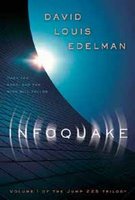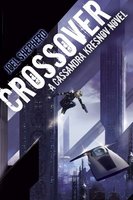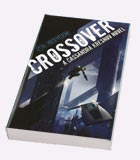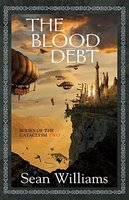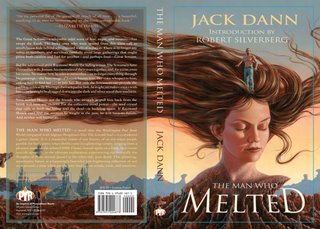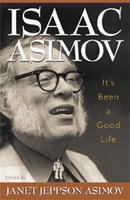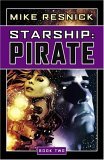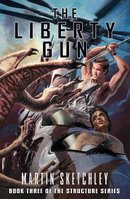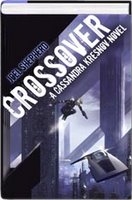Ernest Lilly reviews two Pyr books over on
SFRevu. I'm glad that he seems to like both, while being upfront about what he sees as weaknesses in the works too. But I read these two reviews late last night, rather hurriedly/tiredly and didn't - I confess - glance at the byline. When I was done, I was struck by how
remarkably well written they both were. As a former full-time, now occasional, journalist, I appreciate the well turned phrase, whether its being turned in the service of one of our authors or not. So when I read both reviews back to back, I wasn't surprised to discover both stemmed from the same source. Ernest is the Sr. Editor of SFRevu's as well, though by no means the only reviewer. But I wanted to pause to give a shout out to some good writing before continuing with your regularly scheduled Pyr plug. Now...
Ernest says
a lot of good things about Alan Dean Foster's
Sagramanda, which you can check out for yourself, though what struck me the most is his concluding remarks:
"Alan Dean Foster is a master of creating alien worlds for his protagonists to deal with, but his near future India is more complex and alien than anything he's attempted yet. That's the good news. The bad news is that it doesn't feel like India as much as it feels like one of his created worlds, though I admit I've never been there, and Foster, an accomplished world traveler, had undoubtedly done thorough research on the ground. In the end
, Sagramanda's strength is the author's willingness to engage in cross cultural conversation with people who may well emerge as the technological leaders of this century, but it's only the beginning of a dialog which will hopefully lead to understanding on both sides. To achieve this, Foster needs to keep the story going for another few books, though
Sagramanda has a stand alone feel to it."
The city of Sagramanda is definitely a character in its own right. I don't know that the other (human) characters from the book need to continue, though if New York has a million stories, a city of 100 million - even a fictional one - surely has a few more to tell, right? And Ian McDonald, who wrote the other big Indian novel out now, keeps spinning off new kyberpunk tales. Why not?
Meanwhile, Ernest puts
Joel Shepherd's Crossover on his
highly recommended list and includes a sidebar that notes the books similarity to Masamune Shirow's landmark work
Ghost in the Shell. Again, I encourage you to go read the review for yourself, while I mull over something from his concluding remarks:
" I liked
Crossover both for the hot cyber combat action and the chunks of exposition that the author drops from time to time. Call it perverse, but I think the discussion of technology and philosophy is one of the things that makes SF more interesting than mainstream fiction. As a result I'm all for spending a few paragraphs or even a page or two musing about the humanity of machines, or the cultural subtext of warfare, or why androids need breasts. A more aggressive editor might have trimmed this book back a bit, but I'm glad it didn't happen."
I don't know what I would have done if the manuscript had come in on loose leaf, as opposed to my taking on board a book that was published some years ago in another territory. For N. American debuts of existing work, unless the author expresses a strong desire to revise something specific into an "author's preferred edition," and not counting the correction of any typos that have come to light, I prefer our edition to match the original published edition for the sake of history. I know that if I bought a US book, then read that 50 pages were cut from the Australian or UK edition, I'd be rushing out to see what those 50 pages were. In fact, I held off buying the US edition of the aforementioned Masamune Shirow's latest work of manga, when I heard the US edition was missing 12 pages deemed too "mature" for an American audience.
But in Joel's case, I would like to think I would have resisted the urge to trim the fat here if I'd come to the work cold. For one thing, as Ernest points out, once you get through the first chapter, "the action comes fast and hot by the end and never lets up thereafter." For all the above talk of philosophy and grand ideas, this is one hell of an action story, with machine pistols blazing and bionic women leaping out of flying cars from hundreds of feet in the air. Joel really knows his combat, too, and manages to translate the kinetic feel of anime into prose better than I've ever seen done before. But what I always loved about the Shirow is the way that amid all the violence and hardware fetishization, suddenly the comic book will go into a discourse on geopolitical theory or some social/ethical concern and that's vital for the tone of the work as well.
Plus, I've cited Joel's book several times now, on blogs and on convention panels, as a perfect example of entertainment plus depth, in my ongoing insistence that these are not mutually exclusive concepts. Joel's work is rife with politics and philosophy, as well as sex and combat. Just like its clear inspiration, it manages to marry both rousing adventure and rousing speculation - and while not perhaps a perfect book by all assessments, I hope I would have recognized these asides as central to the work he was creating.
Now, with all these
Ghost comparisons, it should be said that Shirow usually seems to insert these dialogues into the mouths of naked anime girls in a shower or massage scene. Joel, for his part, leaves out that slightly uncomfortable/puerile aspect, trading the somewhat exploitive scenes for a more mature, balanced portrayal of his many strong female characters. Oh, the sex is still there and then some, but it feels sexy not sexist; it's a sexuality that owes more to the well-drawn characterization and tension of something like the relationship between Xena and Gabrielle than it does to Shirow's work. Several female readers asked me recently, in fact, how Joel was able to write women so convincingly, and we not surprised to learn that he also writes about women's basketball as well. So, I guess what I'm saying is - remove the doll-like anime women from
Ghost in the Shell, insert Lucy Lawless, equals great book.
 Novels of 2006, and once again Pyr is on the list with three titles.
Novels of 2006, and once again Pyr is on the list with three titles.

